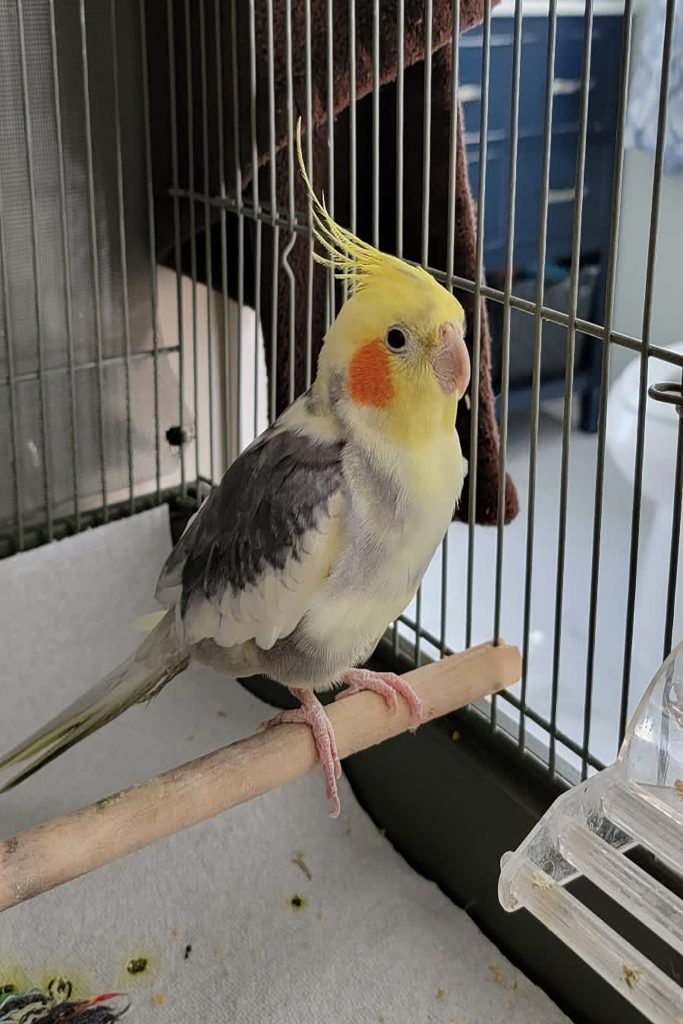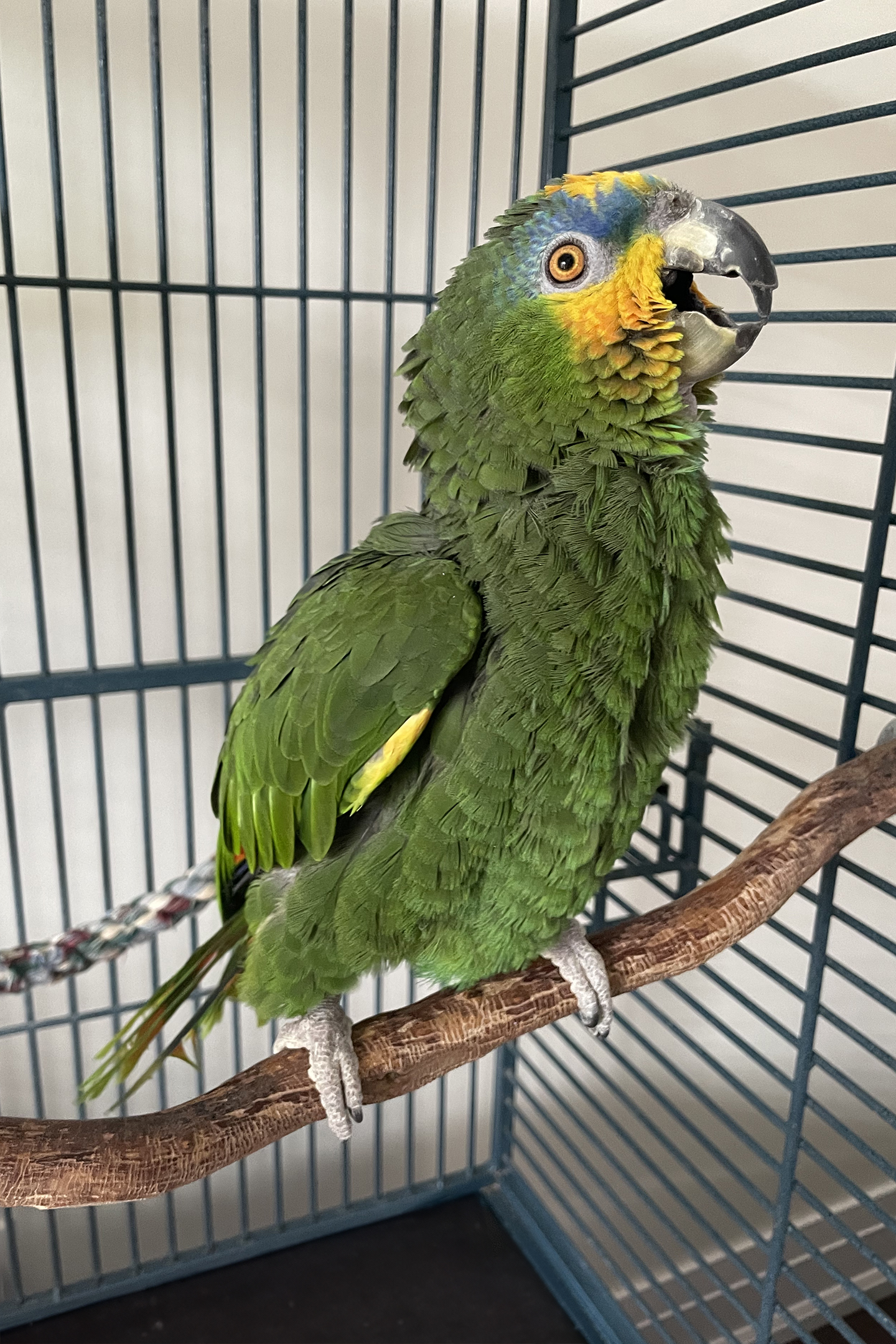WELLINGTON COUNTY – Stanley was born in the spring of 1988. He immigrated illegally to Canada as a stowaway on a flight from Venezuela along with his three siblings.
He arrived with no money, no identification and very little education. Despite being unemployed, and only able to speak a few words of English, he has managed to thrive in his new home.
Stanley is an Orange-Winged Amazon parrot and has been living in Ontario for the last 35 years. It’s likely he will live another 35 years or longer.
For many, exotic birds like Stanley have long held an allure. They come in a breathtaking array of colors, shapes, and sizes, making them captivating pets. However, as with any unique pet, there are both advantages and disadvantages to consider when owning exotic birds.
Dr. Nickey Brown, owner of Campus Estates Animal Hospital in Guelph has been working with exotic animals for over 23 years.
“People are often surprised how much fun [parrots] are to have. And I do think there is a difference owning birds that can talk, because when you walk in the room, they will say ‘hello’ to you,” she said.
Birds are generally self-serving creatures and will select favourite humans. Often, they will just “click” with one person but can shift loyalty if they feel they’ll get more of something from someone else.
“They do like their people. Some birds will choose to hang out on their owner’s shoulders and may even have a preferential owner,” Brown said.
“It’s interesting that a lot of the male birds prefer women and female birds tend to like the men.”
Owning an exotic bird can be rewarding, especially when it comes to companionship, but ownership also comes with several challenges and responsibilities.
Pros
Visual appeal: Many larger birds such as macaws, cockatoos and parrots, are often admired for their bright, colourful feathers. Smaller birds, such as lovebirds, budgies and finches, also have vibrant plumage and can make excellent pets.
Intelligent companions: Many exotic birds are incredibly intelligent and can be trained to perform tricks, mimic sounds, and even engage in conversation. Their cognitive ability make for fascinating companions.
Social interaction: Exotic birds are known to be sociable. They often form strong bonds with their owners and enjoy interaction.
“I find that a lot of times, people look for the talking birds, which tend to be bigger birds. They’re very smart, which makes them a challenge,” Brown said.
“I wouldn’t say they’re the best bird for a first-time bird owner. African Grey parrots for example, are incredibly smart and have an amazing vocabulary, but often people can’t provide enough stimulation. If you don’t know how to cue them properly, you’ll train them inappropriately.”
Long lifespan: Exotic birds typically have a longer lifespan than other pets. With proper care, some species of parrots can live for several decades, making them lifelong companions.
Brown said “some of the bigger, talking birds definitely can have long lifespans; but even some smaller birds like budgies or cockatiels, I have seen to live to 25 years old. It’s not the typical lifespan, but it is something to consider.”

Submitted photo.
Cons
Noise: One of the most significant drawbacks of owning exotic birds is that they can be extremely noisy. Many species are loud and can be disruptive, particularly in small living spaces.
“Different species of birds have different quirks,” Brown said, noting noisy birds can end up being rehomed more than others.
Commitment: Though a long lifespan can be viewed as a benefit, it can also be a drawback. Potential owners must be prepared for a lifelong commitment, which may extend beyond their own lifetime.
Destructive behavior: Exotic birds often have a strong beak and may chew valuables, resulting in injury or costly damages.
“It’s one thing if you have a baby bird, and you’re doing some training, and they bite you, it’s a little pinch. … A love bird for instance, has quite a good bite on it and will draw blood,” Brown said.
Specialized care: Birds require specific diets and care routines, including regular social interaction, proper housing, and enrichment. Neglecting those needs can lead to health and behavioral issues.
Legal and ethical concerns: Legal restrictions may apply, and the trade in wild-caught birds can have detrimental effects on their populations and ecosystems.
According to the Netflix documentary Parrot Confidential, “over 70 per cent of parrots that were transported from the wild died.”
And for those which do survive, it has been estimated that the average parrot will have five to 10 homes in the first seven years of its life.
Brown stressed the importance of housing and nutrition for exotic birds and recommends aspiring bird owners visit goodbirdinc.com.
“Barbara Heidenreich runs Good Bird Inc., she’s not a vet, but she trains and has a lot of information about bird traits. She also does some really great training on the basics to a little bit more complex bird behaviors,” Brown said.
For more information about exotic bird ownership or to learn more about bird nutrition, Dr. Brown recommends harrisonsbirdfood.com or lafeber.com.



